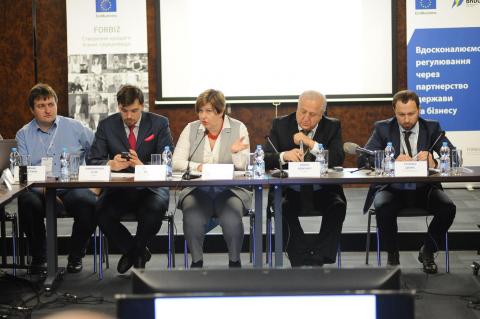
Self-regulation as a form of management and self-control of business associations significantly reduces administrative pressure on business and promotes higher standards of business activity, and hence better protection of consumers' interests, a round table organised by the EU4Business FORBIZ project recently heard.
In Ukraine, legislation allows the creation of self-regulatory organisations (SRO) in 15 types of activities. In fact, only 20 SROs were created in 5 areas: appraisal, land valuation, land management, architectural activities and professional activities in the securities market. At the same time, dozens of associations that act as self-regulatory bodies cannot obtain official status, as they are not covered by the law.
The issue self-regulation in Ukraine were discussed on November 3 during a round table on ‘Self-regulation in Ukraine: Balancing the interests of business, state and consumers’ organised within the framework of the public dialogue #PRODialog under the EU4Business FORBIZ project.
"In Ukraine today there is no holistic approach to self-regulation: 39 normative legal acts that make up the regulatory field do not make it possible to determine either the goal of self-regulation or the status of a self-regulatory organisation. In most activities, self-regulation is not formally possible due to the lack of special legislation, for some types of SROs it is allowed, but no procedure is foreseen. For example, in the field of advertising, auditing, security activities," said Igor Lavrynenko, a leading analyst at the Better Regulation Delivery Office (BRDO) set up by FORBIZ, who presented the results of a study on self-regulation in Ukraine.
In the tourism industry for example, robust associations that have been operating for years and are fully capable of self-regulation, cannot in fact obtain such status.
"The main problem, why today we are talking about deregulation, self-regulation, is the distrust of business to the state. Is there confidence from one business to another so that joint requirements can be negotiated, complementary to the state and jointly funded by an organisation that will monitor compliance? I have my doubts. If we had this trust, we would already have seen the emergence of effective self-regulatory organisations," said the Head of the State Regulatory Service, Ksenia Lyapina.
"SRO regulation is a very delicate process. It is important to maintain the balance and control of the process - on the one hand, not to withdraw powers from the authorities, on the other hand, to enable self-regulatory organisations to develop, to implement their own requirements and rules," Shevki Adjuner, EBRD Director in Ukraine, explained.
The event was attended by representatives of the Ministry of Economic Development and Trade, the Chamber of Commerce and Industry of Ukraine, the Professional Association of Capital Markets and Derivatives, the Agrarian Union of Ukraine, the Phytosanitary Association of Ukraine, business, expert circles and the public.
Funded by the European Union under the EU4Business initiative, the FORBIZ project supports Ukraine’s reform agenda and its economic recovery by proposing a systemic, smart change to a more business-friendly environment with a particular focus on SMEs. The project seeks to steer a shift in policy towards greater recognition of SMEs and the vital role they play in economic recovery, while addressing the challenge of reducing regulatory burden and lessening risk for businesses.
